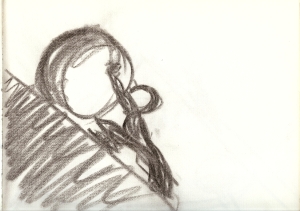Notes:
Existentialists find no meaning or order in existence and yet, they attempt to find some sort of transcendence or meaning. Contradictory? Yes. In fact, it is absurd.
In philosophy, “the Absurd” refers to the conflict between the human tendency to seek inherent value and meaning in life and the human inability to find any.
In this context absurd does not mean “logically impossible”, but rather “humanly impossible”
Absurdism, therefore, is a philosophical school of thought stating that humanity’s efforts to find inherent meaning will ultimately fail
And yet, some absurdists, particularly Camus, state that one should embrace the absurd condition of life while conversely continuing to explore and search for meaning.
As a philosophy, absurdism thus also explores the fundamental nature of the Absurd and how individuals, once becoming conscious of the Absurd, should respond to it.
Absurdism is very closely related to existentialism and nihilism and has its origins in the 19th century Danish philosopher Soren Kierkegaard, who chose to confront the crisis humans faced with the Absurd by developing existentialist philosophy.
Absurdism as a belief system was born of the European existentialist movement that ensued, specifically when the French Algerian philosopher and writer Albert Camus rejected certain aspects from that philosophical line of thought and published “The Myth of Sisyphus.”
Camus identifies three characteristics of the absurd life: revolt (we must not accept any answer or reconciliation in our struggle), freedom (we are absolutely free to think and behave as we choose), and passion (we must pursue a life of rich and diverse experiences).
Camus gives four examples of the absurd life: the seducer, who pursues the passions of the moment; the actor, who compresses the passions of hundreds of lives into a stage career; the conqueror, or rebel, whose political struggle focuses his energies; and the artist, who creates entire worlds.
Absurd art does not try to explain experience, but simply describes it. It presents a certain worldview that deals with particular matters rather than aiming for universal themes.
The book ends with a discussion of the myth of Sisyphus. Camus claims that Sisyphus is the ideal absurd hero and that his punishment is representative of the human condition: Sisyphus must struggle perpetually and without hope of success. As long as he accepts that there is nothing more to life than this absurd struggle, he can find happiness.
Presenting the Myth of Sisyphus as an allegory Camus attempts to justify that life is meaningless absurd and fruitless but it should be taken as a challenge.
As an allegory, Sisyphus symbolizes all humankind and what Sisyphus does is the symbol of what we do every day in our life, because our life and our day-to-day activities are also meaningless like Sisyphus.
But, Camus says that Sisyphus is happy and he should be happy because he has accepted the punishment given to him.
When he is on the bottom, he has a hope that he will reach on the top. Even for a second he is on the top of the hill and looks up and smiles. It is his movement of happiness and scorn to the fate maker.
He also suggests us that we should be hopeful of getting happiness but happiness is always momentary.
He says that we should try to make our own fate and should try to make our own fate and should hate the fate maker.
Therefore, he says that there is no fate that cannot be surmounted by scorn.
“There is no sun without shadow” We should hope but should not be sure of happiness because it is momentary.
__
Albert Camus’s Essay, “The Myth of Sisyphus”: The Myth Of Sisyphus
 After reading the essay, answer the following questions and post them onto http://www.turnitin.com:
After reading the essay, answer the following questions and post them onto http://www.turnitin.com:
Background: The concept of the absurd is born from what Camus sees as a fundamental contradiction in the human condition. On the one hand, we live with an innate desire to find some sort of unity or reason in the universe. This desire to make sense of the universe makes us believe in a meaningful life or in God. On the other hand, the universe gives us no reason to believe that it contains any kind of reason or unity. Though we generally live with a sense of purpose born from our desire for unity, we may occasionally be struck by how senseless everything seems. We may see people riding up an escalator and imagine them as mindless robots, or we might look at a tree and see simply a “thing” that is not part of an ordered or natural universe. This feeling that strikes us occasionally is the feeling of absurdity, the awareness of the contradictory universe in which we live. The absurd man is someone who lives with the feeling of absurdity, who consciously maintains his awareness of the senselessness of everything around him.
Answer the following questions:
- Why did the gods condemn Sisyphus to roll the rock up the mountain?
- In the myth, why didn’t Sisyphus want to return to the underworld?
- Why is Sisyphus the “absurd hero”?
- What were Sisyphus’ passions?
- What moment of Sisyphus’ labor particularly interests Camus? Why?
- Analyze the last line: “One must imagine Sisyphus happy.” Is he happy? Explain.
Class ID: 11011876
Password: Hemingway
